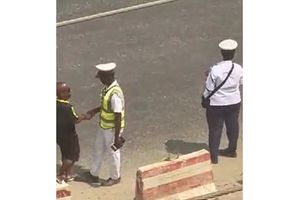When a president and his deputy are on opposite sides of the fence

Kenyan President Uhuru Kenyatta and his running mate William Ruto. They will be facing thier old rival, opposition leader Raila Odinga in the August 8 election. PHOTO | FILE
With Kenya’s general election set for August next year, observers are shocked at the high stakes campaign in which the outgoing President, Uhuru Muigai Kenyatta, 60, and his deputy, William Kipchirchir Samoei Arap Ruto, 55, are leaving nothing to chance in a no-holds-barred battle between them.
Gauntlet
Last week, President Kenyatta threw down the gauntlet by asking Ruto to step down as Deputy President, instead of continuing to snipe at the government he is part of.
Observers ask: what is going on between the president and his deputy, pray?
Not so long ago, the two were donning matching neckties and shirts, exuding confidence in their ‘Bromance:’ a relationship which seems to have soured to the level that the president has asked his deputy to resign.
How did our Kenyan brothers come to this apocalypse? Are there any lessons for Tanzanians in this saga next-door?
Political fallouts are potentially a cause for trouble in governance anywhere.
Post-election violence has almost invariably been erupting after elections in Kenya. But, the 2007/2008 election was the apogee of it all, as one of its outcomes was the International Criminal Court (ICC) case in which the president and his deputy were charged with crimes against humanity.
That case brought the two closer together – and, in the event, the two went on to win the 2013 general election with relative ease.
Things were hunky-dory for the first two years of their government.
Then that notorious handshake between Kenyatta and the Orange Democratic Movement (ODM) leader, Raila Amolo Odinga, 76, on March 9, 2018 following the highly divisive, violent August 2017 general election made matters worse between Kenyatta and Ruto.
Presidential baton
The handshake was seen by critics as a quest by Kenyatta to hand over the presidential baton to his political nemesis Odinga. This was despite an unwritten pre-the 2017 elections pact that Ruto would succeed Kenyatta as president.
Today, Kenyatta is perceived to be lobbying for Odinga as the next president of Kenya – thus irking his deputy and his political followers no end.
The gloves are off, and Ruto – who is said to have the backing of Uganda President Yoweri Kaguta Museveni, 77 – is said to have made up his mind to pursue the Presidency without the backing/blessings of President Kenyatta.
Deep-seated differences
However, such deep-seated differences between a sitting President and his Deputy are not unknown. But, what is new here is the vicissitudes that underlie the epic Kenyatta/Ruto battle.
‘Old money’ – in the form of Uhuru Kenyatta, thanks to his fabulously wealthy father and Kenya founder-President Jomo Kenyatta (1897-1978) – is fighting ‘new money,’ William Ruto…
A new twist has been added to the agenda, in the form of neighbouring Heads of States/Government.
Ruto is selling the idea that he is the common man’s election candidate, versus the dynasties narrative – which the youth who were born in the 1990s onwards seem to have bought lock, stock and barrel.
For the next one year, it is going to be a battle between state operatives and someone who is also a high-level government insider – but who is manacled by the very machinery he has been serving.
Who will win here? The answer is in looking at how Raila Odinga has lost presidential elections twice: once to Emilio Stanley Mwai Kibaki, 90, and again to Uhuru Kenyatta.
That is why Odinga has pointedly said that he is seeking Kenyatta’s vote, as he needs it to win at the polls.





